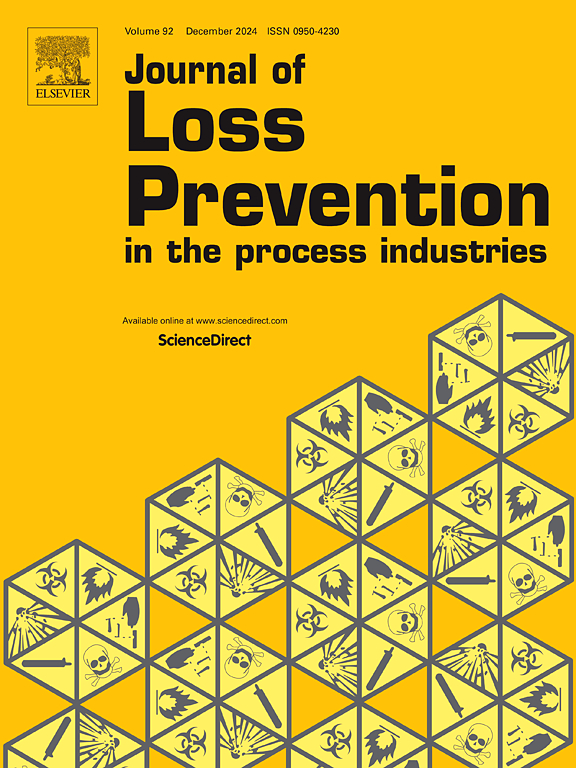Zinc phytate@chitosan bio-powder renders explosion suppression of titanium powder involved in industrial processes
IF 3.6
3区 工程技术
Q2 ENGINEERING, CHEMICAL
Journal of Loss Prevention in The Process Industries
Pub Date : 2024-11-05
DOI:10.1016/j.jlp.2024.105482
引用次数: 0
Abstract
Titanium powder easily accumulates during industrial processes, and its high reactivity poses unavoidable hazards to both industrial operations and human safety. To suppress the explosion of titanium powder, zinc phytate (Zn-PA) and chitosan (CS) are mixed and prepared into a new bio-inhibitor using hydrothermal-solvothermal synthesis. The suppression effects of Zn-PA@CS bio-powder on the explosion pressure and temperature of titanium powder under different inerting ratios (α) are investigated using a 20 L spherical explosion testing system. The results show that when the α of Zn-PA@CS bio-powder is 0.8, the maximum explosion pressure (Pmax) and the maximum rate of pressure rise ((dP/dt)max) of titanium powder decrease by 82.8% and 91.2%, respectively. Moreover, the maximum flame temperature (Tp) drops from the initial 647 °C–38 °C. Combined with TG-DSC analysis, Zn-PA@CS bio-powder produces phosphorus-containing substances during high-temperature thermal decomposition, which consume a large number of free radicals essential for the explosion. Furthermore, Zn-PA@CS bio-powder generates solid and gaseous substances, leading to the formation of a dense carbonaceous residue that covers the titanium powder, acts as an effective barrier, and dilutes oxygen concentration, thereby further inhibiting the explosion reaction. The Zn-PA@CS bio-powder exhibits a synergistic effect in both physical and chemical suppression. This study provides technical support for developing biomass explosion suppression powder and for preventing and controlling explosion accidents in industrial production.
植酸锌@壳聚糖生物粉末可抑制工业流程中钛粉的爆炸
钛粉在工业生产过程中容易积聚,其高活性对工业操作和人身安全造成不可避免的危害。为了抑制钛粉的爆炸,采用水热-溶热合成法将植酸锌(Zn-PA)和壳聚糖(CS)混合制备成一种新型生物抑制剂。利用 20 L 球形爆炸试验系统研究了不同惰性比 (α)下 Zn-PA@CS 生物粉末对钛粉爆炸压力和温度的抑制作用。结果表明,当 Zn-PA@CS 生物粉末的惰性比 α 为 0.8 时,钛粉的最大爆炸压力(Pmax)和最大压力上升率(dP/dt)max 分别降低了 82.8%和 91.2%。此外,最大火焰温度(Tp)也从最初的 647 °C 下降到 38 °C。结合 TG-DSC 分析,Zn-PA@CS 生物粉末在高温热分解过程中产生含磷物质,消耗了大量爆炸所必需的自由基。此外,Zn-PA@CS 生物粉末还会产生固态和气态物质,形成致密的碳质残渣,覆盖在钛粉上,起到有效的屏障作用,并稀释氧气浓度,从而进一步抑制爆炸反应。Zn-PA@CS 生物粉末在物理和化学抑制方面表现出协同效应。该研究为开发生物质抑爆粉末、预防和控制工业生产中的爆炸事故提供了技术支持。
本文章由计算机程序翻译,如有差异,请以英文原文为准。
求助全文
约1分钟内获得全文
求助全文
来源期刊
CiteScore
7.20
自引率
14.30%
发文量
226
审稿时长
52 days
期刊介绍:
The broad scope of the journal is process safety. Process safety is defined as the prevention and mitigation of process-related injuries and damage arising from process incidents involving fire, explosion and toxic release. Such undesired events occur in the process industries during the use, storage, manufacture, handling, and transportation of highly hazardous chemicals.

 求助内容:
求助内容: 应助结果提醒方式:
应助结果提醒方式:


